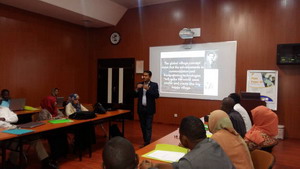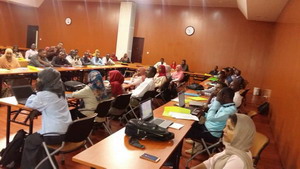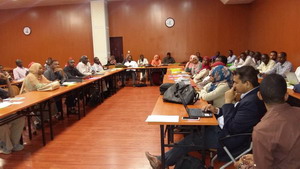 WHO facilitating the community-based surveillance workshop in Khartoum, Sudan. WHO photo.Khartoum, 19 November 2018 – With the aim of improving the local health system in Sudan, the World Health Organization (WHO) in joint efforts with Sudan’s Federal Ministry of Health organized a 2-day national training of trainers workshop in Khartoum to launch the roll out of community-based surveillance in Sudan.
WHO facilitating the community-based surveillance workshop in Khartoum, Sudan. WHO photo.Khartoum, 19 November 2018 – With the aim of improving the local health system in Sudan, the World Health Organization (WHO) in joint efforts with Sudan’s Federal Ministry of Health organized a 2-day national training of trainers workshop in Khartoum to launch the roll out of community-based surveillance in Sudan.
The system will target 10 states covering more than 7100 villages in rural, inaccessible and remote areas to assist in the early detection of and timely response to common public health threats and suspected communicable diseases.
The workshop was attended by 48 nationals from the surveillance departments in the federal and states ministries of health and focused on building their capacity to establish community-based surveillance systems in their states and localities through selecting appropriate village-level community volunteers.
The training also addressed issues relating to the national surveillance system for communicable diseases and identifying 26 reprioritized diseases and syndromes such as malaria, neglected tropical diseases, vaccine-preventable diseases, tuberculosis, HIV/AIDS and others, as well as nutrition and reproductive health.
“This is the first time in Sudan that WHO and the Federal Ministry of Health have undertaken such a joint and enormous effort to establish community-based surveillance in 10 states with the ultimate goal of strengthening a community- and locality-level surveillance system run by local volunteers,” said Dr Naeema Al Gasseer, WHO Representative in Sudan. “This system will provide active rather than passive surveillance empowering communities to detect rapid community public health threats and contain them in proper time. In the year of the 40th anniversary of the Declaration of Alma-Ata on primary health care that promotes community participation, such endeavours will benefit role of communities in strengthening health services and the health systems resilience", added Dr Naeema.
 Participants in the WHO-supported workshop on community-based surveillance. WHO photo.Although sentinel sites cover almost all 189 localities in Sudan, less than 30% of health facilities are accommodated by the existing surveillance system. Health workers in a number of states have also identified inequality of access and uptake of services, with different patterns of health-service seeking behaviour.
Participants in the WHO-supported workshop on community-based surveillance. WHO photo.Although sentinel sites cover almost all 189 localities in Sudan, less than 30% of health facilities are accommodated by the existing surveillance system. Health workers in a number of states have also identified inequality of access and uptake of services, with different patterns of health-service seeking behaviour.
“The population with limited to no access to health facilities remains unaware of the implications of health emergencies and threatening potential outbreaks in the community,” said Dr Ahmed Salih, a public health professional. “It is our responsibility to protect and raise the awareness of communities on health risks and to strengthen national capacities on the early detection and reporting of health risks, including regarding rumours about any suspected diseases,” he added.
WHO has been supporting the health authorities in Sudan to detect, prevent, monitor, and respond to health emergencies, in addition to the elimination of tropical diseases, using an integrated disease surveillance system.
“WHO played a critical role in controlling outbreaks like chikungunya in eastern Sudan,” said Dr Salah Salim, a workshop participant from eastern Sudan. “Effective communicable disease control relies on effective response systems and effective response systems rely on effective disease surveillance, which is what WHO is supporting us to build in Sudan” he added.
 Participants at the workshop on community-based surveillance. WHO photo.Sudan faces continuous outbreaks and epidemic events of major communicable and epidemic-prone diseases. To date, WHO and the Federal Ministry of Health have taken two important steps towards an integrated disease surveillance and response system, in terms of disease reprioritization and re-categorization as per reporting priorities. This and other WHO support in Sudan are a result of the generous contributions from the Sudan Humanitarian Fund (SHF), Central Emergency Response Funds (CERF), the Office of US Foreign Disaster Assistance (OFDA), Qatar Darfur Development Fund, Government of Japan, and the Government of Italy.
Participants at the workshop on community-based surveillance. WHO photo.Sudan faces continuous outbreaks and epidemic events of major communicable and epidemic-prone diseases. To date, WHO and the Federal Ministry of Health have taken two important steps towards an integrated disease surveillance and response system, in terms of disease reprioritization and re-categorization as per reporting priorities. This and other WHO support in Sudan are a result of the generous contributions from the Sudan Humanitarian Fund (SHF), Central Emergency Response Funds (CERF), the Office of US Foreign Disaster Assistance (OFDA), Qatar Darfur Development Fund, Government of Japan, and the Government of Italy.





